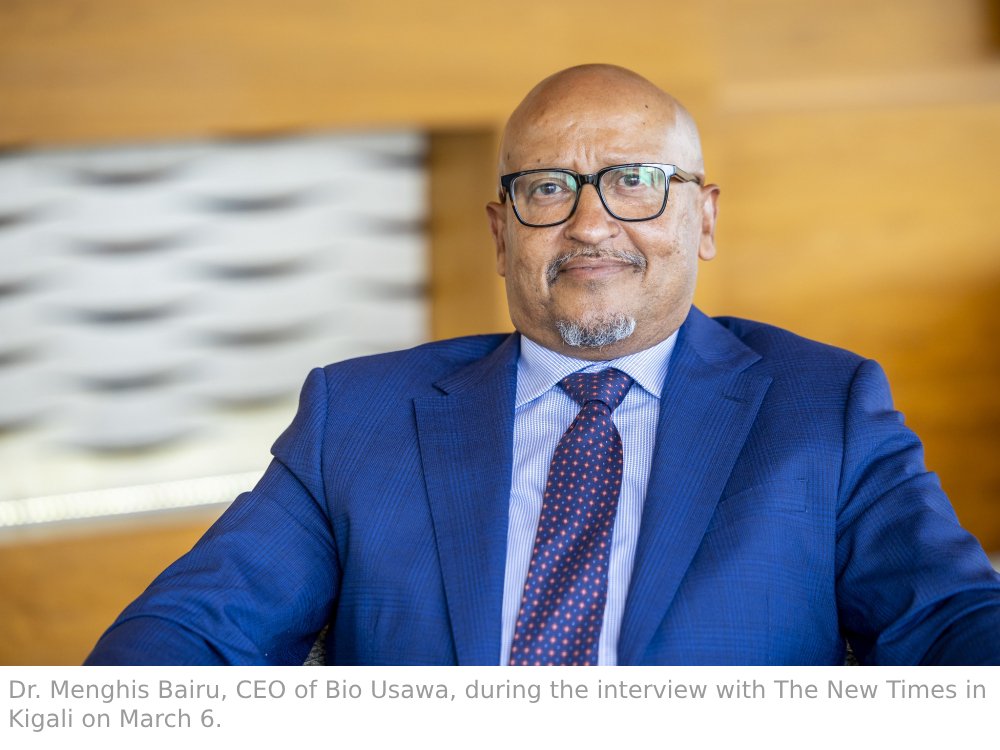Date:March 17, 2025

Rwanda is set to become home to Africa’s first manufacturing plant for eye care products and monoclonal antibodies targeting cancer, with completion expected by 2026, according to Dr. Menghis Bairu, CEO of Bio Usawa.
Bairu announced the development in an exclusive interview with The New Times, following a partnership between Bio Usawa—a US-based healthcare company—and the Rwanda Development Board (RDB).
The facility aims to provide affordable treatments for serious eye diseases, such as diabetic macular edema, and significantly reduce the cost of cancer medication in Africa.
Advancing cancer treatment in Africa
Among the drugs to be produced at the plant is Herceptin (Trastuzumab), a monoclonal antibody used in breast cancer treatment.
According to Bairu, patients on this drug have a five-year survival rate of 95%, compared to just 5-10% without access to the treatment.
The production of Trastuzumab will follow a successful smaller-scale manufacturing of the Aflibercept antibody, which treats diabetic macular edema.
Despite being available for over 25 years, this drug remains prohibitively expensive, with a full course costing between $60,000 and $70,000.
“It is crucial to establish local production systems to make these life-saving treatments available to patients at the lowest possible cost,” Bairu emphasized.
Why Rwanda?
The decision to set up the plant in Rwanda came after a continent-wide assessment, during which Bio Usawa found Rwanda’s business environment to be the most supportive.
“What we observed here in Rwanda is that the entire system is very accommodating and ready to support infrastructure setup in an expedited manner,” Bairu said.
He praised Rwanda’s investor-friendly policies, particularly the presence of a one-stop center that eliminates bureaucratic delays. “Unlike in many places, here you can receive responses within hours or just a few days,” he noted.
Monoclonal antibodies vs. chemotherapy
Bairu highlighted the advantages of monoclonal antibody treatments over traditional chemotherapy, which often causes severe side effects.
Monoclonal antibodies offer precision medicine by specifically targeting and neutralizing cancerous cells while minimizing damage to healthy tissue.
Making advanced medicine affordable
To ensure affordability, Bio Usawa is leveraging its team’s experience, including members who were part of the original Genentech setup—an industry pioneer in monoclonal antibody manufacturing. The company aims to cut prices by 80% initially and up to 90% as production scales across Africa.
“Our focus is on reducing the core production costs while maintaining a minimal profit margin to make these medicines accessible,” Bairu explained.
Construction timeline and future outlook
Bio Usawa has already submitted its plans to the Rwanda Food and Drug Authority. Modular plants are expected to arrive in Rwanda by the end of 2025, with the facility fully operational by early 2026.
“Our goal is to have a GMP-compliant facility by the first quarter of 2026 and to manufacture the first monoclonal antibody by 2027,” Bairu stated.
The project is backed by pre-seed funding from African investors and the diaspora, ensuring its sustainability. “We aim to export high-quality monoclonal antibodies to Western markets,” Bairu added.
Ensuring self-sufficiency in medicine production
Patrick Lukulay, Chief Operating Officer at Bio Usawa, stressed the significance of local production, particularly during crises like pandemics that disrupt supply chains.
“Once you obtain a cell line, you become self-sufficient in generating finished products on demand,” he explained.
Lukulay also reaffirmed the company’s commitment to maintaining international manufacturing standards. “There can be no double standards when it comes to medicine,” he said. However, affordability remains a priority.
“We know what drives up costs in developed countries, and we’re tackling those barriers to ensure patients can access the treatments they need.”
As the initiative moves forward, Lukulay urged African policymakers to support local production investments.
“It’s crucial to establish policies that enable these investments to succeed. Strengthening local manufacturing is in our collective interest as we tackle major health challenges,” he concluded.
With this initiative, Rwanda is poised to play a leading role in transforming healthcare accessibility across Africa, providing life-saving treatments at a fraction of their current cost.
SOCAP is the world’s largest annual impact event, providing change makers, entrepreneurs and institutional investors the opportunity to learn from each …
April 2025Bio Usawa’s Co-Founder, CEO and President, Dr. Menghis Bairu, has been invited to the prestigious World Local Production Forum, to be held in Abu Dhabi,…
March 2025Yesterday, during our ongoing mission in Senegal, the Bio Usawa team met with officials from the Ministry of Health and Agence Sénégalaise de Réglementa…
March 2025